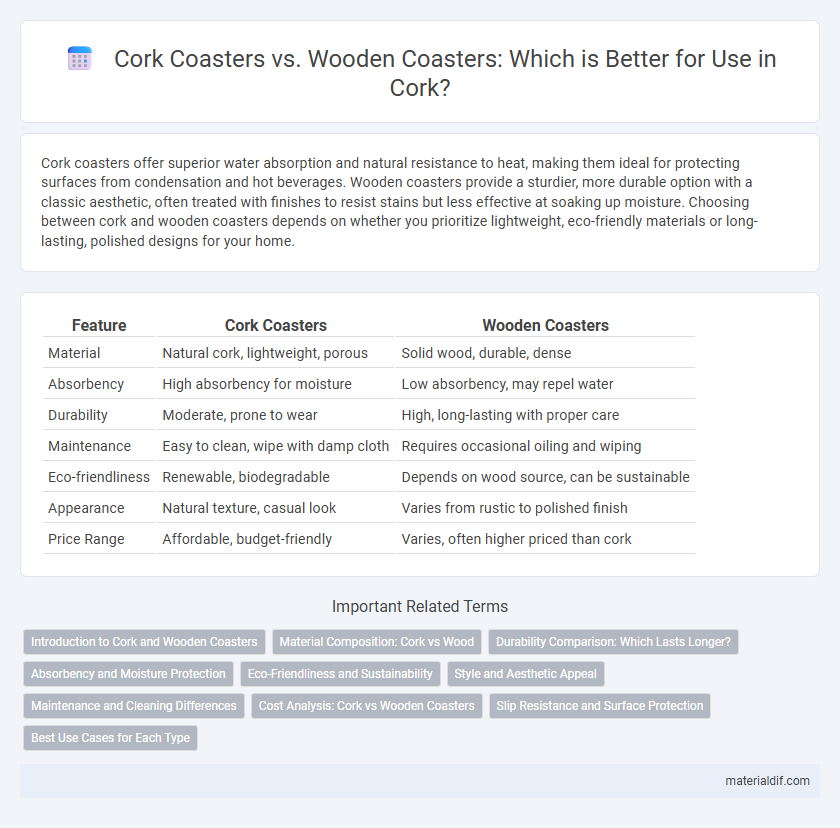Cork coasters offer superior water absorption and natural resistance to heat, making them ideal for protecting surfaces from condensation and hot beverages. Wooden coasters provide a sturdier, more durable option with a classic aesthetic, often treated with finishes to resist stains but less effective at soaking up moisture. Choosing between cork and wooden coasters depends on whether you prioritize lightweight, eco-friendly materials or long-lasting, polished designs for your home.
Table of Comparison
| Feature | Cork Coasters | Wooden Coasters |
|---|---|---|
| Material | Natural cork, lightweight, porous | Solid wood, durable, dense |
| Absorbency | High absorbency for moisture | Low absorbency, may repel water |
| Durability | Moderate, prone to wear | High, long-lasting with proper care |
| Maintenance | Easy to clean, wipe with damp cloth | Requires occasional oiling and wiping |
| Eco-friendliness | Renewable, biodegradable | Depends on wood source, can be sustainable |
| Appearance | Natural texture, casual look | Varies from rustic to polished finish |
| Price Range | Affordable, budget-friendly | Varies, often higher priced than cork |
Introduction to Cork and Wooden Coasters
Cork coasters offer natural water absorption and durability, sourced from the bark of cork oak trees primarily found in Mediterranean regions. Wooden coasters, crafted from various hardwoods like oak, maple, or bamboo, provide sturdy protection and an elegant aesthetic for tabletops. Both materials are eco-friendly, but cork's lightweight texture and moisture resistance make it especially popular for preventing condensation rings on surfaces.
Material Composition: Cork vs Wood
Cork coasters are made from the bark of the cork oak tree, offering a natural, lightweight, and water-resistant surface that absorbs moisture effectively to protect furniture. Wooden coasters, typically crafted from hardwoods like oak, maple, or walnut, provide a sturdy and durable option with unique grain patterns but lack the inherent moisture absorption properties of cork. The porous structure of cork makes it more resistant to heat and staining compared to solid wood, which can warp or crack over time if exposed to moisture.
Durability Comparison: Which Lasts Longer?
Cork coasters offer moderate durability due to their natural flexibility and resistance to moisture, making them ideal for absorbing condensation without warping. Wooden coasters, especially those made from hardwoods like oak or teak in Cork, provide superior longevity with robust resistance to scratches and wear over time. While cork coasters are eco-friendly and lightweight, wooden coasters tend to last longer under daily use, maintaining their structural integrity and aesthetic appeal in the Cork environment.
Absorbency and Moisture Protection
Cork coasters excel in absorbency, effectively soaking up condensation and preventing moisture rings on surfaces, making them ideal for protecting furniture. Wooden coasters, while offering sturdy protection, typically have lower absorbency and may allow moisture to pool on the surface, potentially leading to water damage over time. Their natural grain patterns can enhance decor, but cork's superior moisture-wicking properties provide more reliable surface protection.
Eco-Friendliness and Sustainability
Cork coasters are highly eco-friendly due to cork's renewable nature, harvested from cork oak trees without causing harm, allowing the bark to regenerate naturally. Wooden coasters, while biodegradable, often require tree cutting and longer growth periods, leading to greater environmental impact compared to cork. Cork's sustainable harvesting practices and inherent biodegradability make it a superior choice for environmentally conscious consumers in Cork and beyond.
Style and Aesthetic Appeal
Cork coasters offer a natural, textured look that complements rustic and minimalist decor, while wooden coasters provide a richer, polished aesthetic suitable for classic or vintage interiors. Cork's light, neutral tones blend seamlessly with modern designs, whereas wood showcases grain patterns and finishes that add warmth and sophistication. Choosing between them depends on whether you prefer eco-friendly simplicity or refined elegance to elevate your table setting.
Maintenance and Cleaning Differences
Cork coasters require minimal maintenance due to their natural resistance to moisture and staining, making them easy to clean with a simple wipe using a damp cloth. Wooden coasters need more regular care, including occasional oiling to prevent drying and cracking, and may require gentle scrubbing to remove stubborn stains. Cork's porous texture absorbs spills quickly, whereas wood's solid surface allows for easier removal of debris but demands more attention to avoid water damage.
Cost Analysis: Cork vs Wooden Coasters
Cork coasters generally offer a more cost-effective solution due to the abundant availability and low harvesting expenses of cork bark, while wooden coasters often incur higher production costs because of lumber prices and intricate craftsmanship. Cork's lightweight and renewable properties reduce long-term replacement costs compared to wooden variants, which may be prone to warping or staining and require more maintenance. Economically, cork coasters present better value for budget-conscious consumers seeking durability combined with environmental benefits.
Slip Resistance and Surface Protection
Cork coasters offer superior slip resistance due to their naturally grippy texture, preventing glasses from sliding on smooth surfaces. Wooden coasters, while stylish, often lack this inherent traction and may require additional treatments or coatings to improve stability. Both materials provide effective surface protection, but cork's soft and absorbent nature better cushions furniture against moisture rings and scratches.
Best Use Cases for Each Type
Cork coasters excel in absorbing moisture, making them ideal for cold or condensation-prone drinks commonly enjoyed in Cork's humid climate. Wooden coasters offer durability and aesthetic appeal, well-suited for serving hot beverages or as long-lasting table decor in Cork's traditional pubs and homes. Selecting between cork and wooden coasters depends on the beverage type and desired balance of functionality and style specific to Cork's hospitality environment.
Cork Coasters vs Wooden Coasters Infographic

 materialdif.com
materialdif.com